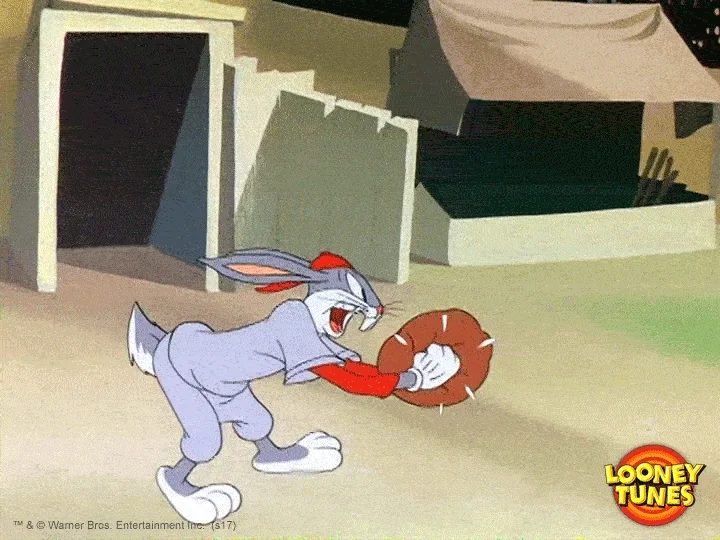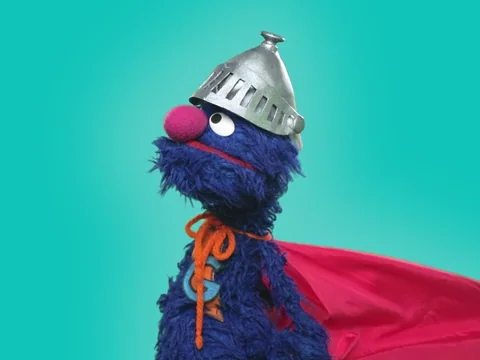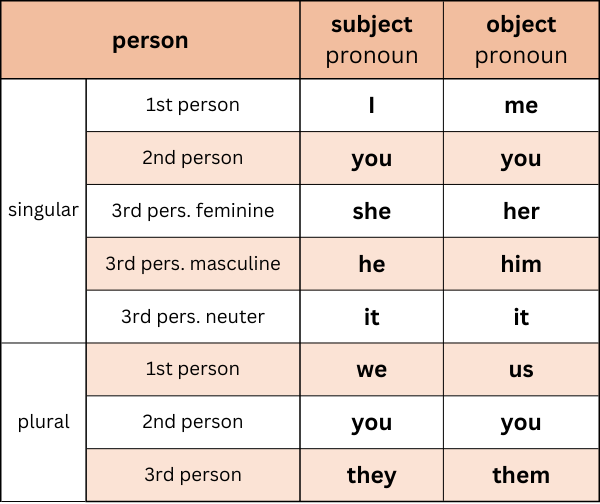
This logo isn't an ad or affiliate link. It's an organization that shares in our mission, and empowered the authors to share their insights in Byte form.
Rumie vets Bytes for compliance with our
Standards.
The organization is responsible for the completeness and reliability of the content.
Learn more
about how Rumie works with partners.

Confused about English pronouns?
Consider these sentences:
I know you.
You know me.
Both sentences have no mistakes.
But why do we need to say, “You know me”? Why is it WRONG to say, “You know I”?
“I” and “me” are both personal pronouns, but they have different jobs in a sentence. "I" is an example of a subject pronoun. "Me" is an example of an object pronoun.
What exactly are subject and object pronouns?
Object pronouns are catchers

In the image above, Bugs Bunny tries to catch a ball, but the ball pushes him (very fast!). "Him" is an object pronoun.
Remember the first example sentence: I know you.
Like "him," “you” has the job of catcher. It receives (catches) the action of the verb “know.” It is the object of “know.”
Here, “you” is an object pronoun.
Now, remember the second example sentence: You know me.
"Me" catches the action of "know." It is an object pronoun.

Examples of object pronouns:
Leo: Thanks for the sandwiches! I love them.
Ava: Don’t thank me. Dan made them. You can thank him!
Subject pronouns are heroes!

For “I know you,” "I"is the hero, showing the subject.
“I” is always a subject pronoun. It shows the subject of a verb. The subject is the hero of the verb’s action—the one who does the action.

Now, remember the second example sentence: You know me.
Here, “you” is a subject pronoun. It has switched roles! “You” is now the hero, and “me” is the catcher (object pronoun).
Examples of subject pronouns:
Leo: I have cake!
Dan: You do? I want it, please!
Leo: It’s ready to eat! You can have this fork.
Dan: Thanks! We can also bring some cake to Ava. She loves cake!
Did you know?
In the dialogue, you see the form "it’s." This is a contraction (short form) of the subjective pronoun "it" and the verb "is." It’s = it is.
Pronoun forms
Each subject pronoun has a matching object pronoun.
Sometimes, the subject and object forms are the same. Also, 2nd person pronouns are the same in singular and plural.
 Table created by the author with Canva. To hear an audio description of the table, click play on the audio player below:
Table created by the author with Canva. To hear an audio description of the table, click play on the audio player below:
Quiz
Which sentence uses pronouns *correctly*? Choose any correct answer:
A has a correct subject pronoun (“They”). C has a correct subject pronoun (“I”) and object pronoun (“him”). In B, “her” should be “she” because it is the subject (hero) of the verb “is.” In D, “we” should be “us” because it receives (catches) the action “bring.”
More uses of object pronouns
These examples of object pronouns are also correct:
Where are they?
Give the cake to me!
The dog loves both you and me.
He goes to school with Kat and me.

Why?

Sentence: Where are they?
“They” is after the verb, but it is still the subject of “is.” We still need a subject pronoun, not an object pronoun. English switches the order of words in a question like this.

Sentence: Give the cake to me!
“To” is a preposition. Pronouns use object forms after prepositions.

Sentence: The dog loves both you and me.
“You” and “me” are both receiving/catching the action “loves.”

Sentence: He goes to school with Kat and me.
“Kat” and “me” are both objects of the preposition “with,” similar to example 2.
Quiz
Look at this sentence: "The president is giving a medal to _____!" Which pronouns can correctly fit in the blank space? Choose any correct answer:
“Her,” “them,” and “you” are all object pronouns. The preposition “to” needs an object form after it. “I” is only a subject pronoun. “I” would need to change into “me” to fit into this sentence.
Common mistakes

These sentences are INCORRECT:
This cat hates Carol and I.
Me and Carol love cats.
Why?
1 incorrectly uses a subject pronoun.
2 incorrectly uses an object pronoun.
Many English speakers confuse subject and object pronouns when the pronouns are next to "and."
However, conjunctions like "and" do not change the pronoun form. Pronoun forms only change when their roles change.
How do we fix these sentences?
This cat hates Carol and me. ("Carol" and "me" are both objects.)
Carol and I love cats. ("Carol" and "I" are both subjects.)
...and why NOT "I and Carol love cats"?
"Me and Carol" doen't fit formal English word order. In a list, we give third-person nouns/pronouns (Carol), then second-person pronouns, and finally first-person pronouns (I/me). This word order is the same for subjects, objects, and any other role a noun/pronoun is playing.
Conversation example
At the Art Museum
 Photo credit: Mid-Hudson Auction Galleries
Photo credit: Mid-Hudson Auction Galleries
Examples of object pronouns are in bold.
Leo: Do you like the statue?
Ava: It's not beautiful to me...but someone probably likes it!
Dan: It confuses me. Why did someone make a statue of him?
Ava: The museum guides are talking about it now. I want to hear them.
Leo: They're not talking to us. I don't want to be rude!
Dan: I'll listen with you, Ava.
Leo: It's art! Just enjoy it!
Quiz
Imagine that you're at the grocery store. You might hear people saying these sentences. Which sentences *correctly use* object pronouns? Choose any correct answer:
B and C are correct. In B, “it” is the object (catcher) of “want.” In C, “them” is the object of “see.” In A, “I” needs to change to “me” because it is an object of the preposition “for.” In D, we switch the word order to ask a question, but we still need the subject (hero) form “he” to go with “is.” “Him” is the object pronoun and is not correct here.
Take Action
Keep practicing! May the Force be with you! (Famous movie quotes have MANY object pronouns.)

This Byte has been authored by
Elisabeth Lorenc
Instructional Designer
M.S.


